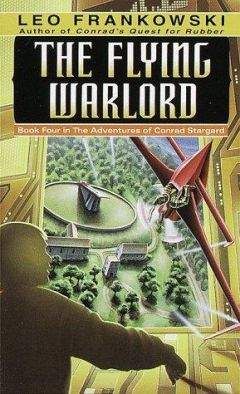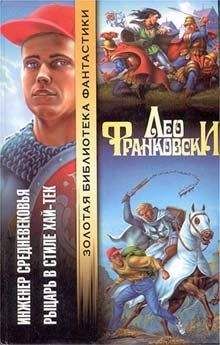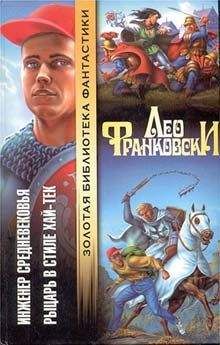Лео Франковски - The Flying Warlord

Скачивание начинается... Если скачивание не началось автоматически, пожалуйста нажмите на эту ссылку.
Жалоба
Напишите нам, и мы в срочном порядке примем меры.
Описание книги "The Flying Warlord"
Описание и краткое содержание "The Flying Warlord" читать бесплатно онлайн.
There were screams and moans from all quarters, but I got my way.
Furthermore, all new hires, women as well as men, had to go through the six-month training period before they could start work. I required the women to be trained because when we went off to war, I planned to take every able-bodied man with me. The women would have to "man" the wall guns and other defenses without us. And this meant setting up a training program for the wives of my managers as well.
Then there were the river defenses. If the weather was right, and the rivers weren't frozen, we just might be able to stop the Mongols at the Vistula, or even at the Bug. We already had good steam engines and a carpentry shop set up for mass production. Steamboats should be a fairly straightforward proposition. The troops manning them would be hired from among existing riverboat men and then put through the full-year basic-training program. Then, after that, they'd have to learn about fighting from a steamboat on the job.
The regular army would be a full-time group based on the training instructors I already had. Besides training everybody else, they had to multiply their own numbers by at least six each year for the next three years, and then twice more in the last year to get us an army big enough to do the job. And those were absolute minimums. Anything less than fifty thousand men would just get us all killed. The production quotas for the factories were set up for a hundred fifty thousand.
From an economic standpoint, land transport was even more important than river transport. All of the roads were so bad that it was almost impossible to get a cart over them. Almost all goods were transported by caravan mule, and the best of them could only carry a quarter ton. They could only do thirty miles a day and had to be loaded and unloaded twice a day at that. But on level ground, on a steel track and steel wheels with good bearings, a mule should be able to tow two dozen times what it could carry on its back.
But more important than economics was the fact that my army was being trained to fight with war carts. Swivel guns mounted in big carts would fire over the heads of the pikemen towing the cart. I had to get the troops to the battlefields quickly and in reasonably good shape. It was time to build railroads.
And if I was going to build a transport system, I was going to build it right from the beginning. All the railroad tracks would be wide gauge and that gauge would be absolutely standardized. And we would containerize right from the start. Our war carts were six yards long, two yards wide and a yard and a half high. That would be our standard container size. All chests and barrels would be sized to fit neatly within the container, and anything nonstandard would get charged double rates, at least. The four wheels on a war cart were two yards high and mounted on casters, and each could be locked either fore and aft or to the side. Fore and aft, the center of the wheels were two yards apart, so that was the standard track gauge, and future carts would have flanged wheels to keep them on the track. If they tore up the ground when going cross country, tough.
Then we needed maps, and there weren't any. How a medieval general ever commanded troops without adequate maps was beyond me, and I didn't intend to learn. I'd had the machine shop make up some crude but usable theodolites (they didn't have a telescope on them, just iron sights like on a gun) and I had a good mathematician, Sir Piotr, to put in charge of the project. He could train others.
And we needed radios. Integrated circuits, transistors, and even tubes were well beyond us, and would be for years. I'd been able to muddle my way through a lot of things because I was too ignorant to know what I was getting into. With electronics, I knew what the problems would be, and they frightened me! Where would I get the rare-earth oxides needed to make a decent cathode? How would I develop alloys with the same temperature coefficients as our glass to take wires into the tube without shattering it? How could I possibly get a good enough vacuum?
But working radios were invented long before there were tubes. They used spark-gap transmitters and coherers to pick up the signals, and with enough work, I thought I could get one going. With radios, I could effectively double our speed, since I wouldn't have to send a runner to convey every order. Speed was the one area where the Mongols would be our undoubted superiors. Those shaggy ponies could move!
Radios were an absolute first priority.
The mass ended and we all walked over to the reception area. I stood in line to kiss the bride, even though I had done it all-too-many times before. Cilicia kissed the groom full on the mouth and warmly, probably because she too was glad to see Krystyana married off. As we went to the sideboard to get a couple of glasses of mead, my liege lord came up.
"Ah, Baron Conrad! You seem to be enjoying yourself!" Count Lambert said. Cilicia remained silent around my lord. They didn't get along.
"I might as well, my lord, seeing as how I'm footing the bill for the wedding feast," I said.
"And the dowry as well, I suppose?"
"Of course, my lord. After all, I've had three children by Krystyana and it seems the least I could do. I'm just glad that the kids will have a proper father."
"Indeed. I'm surprised that the Church hasn't come down on you for it."
"I'm sure that they are keeping careful notes, my lord. The inquisition concerning me is still up in the air."
"That's not all that's up there! I trust you've looked up sometime in the last hour?"
I hadn't, but I did so now. There was this thirteenth century sailplane circling overhead.
"I guess I must have been thinking about something else, my lord. There must be quite a thermal above the town."
"Quite. It's doubtless helped by the way every fire in the town is burning bright on a warm, calm day. You don't think that's cheating, do you?"
"I guess not, my lord. We never qualified what it had to do to stay up, only that it had to fly for two hours. It looks like it's climbing. The wager is yours."
"Good! Then where is my aircraft engine?"
"Still in my head, my lord, but I'll get working on it as soon as I get back to Three Walls. Perhaps I can deliver something to you in a few months."
"It will take that long? The boys were hoping to get started immediately!"
"It will take at least that long, my lord. Do you realize what you're asking? It's not just designing and building the mechanical parts, though that's going to be hard enough! I have no idea how we'll go about machining a crankshaft on one of our lathes! There's a lubrication system to worry about and a carburetion system. And how am I to make a spark coil with nothing but beeswax and paper for insulators? And spark plugs! Thermal expansion problems alone could kill us right there! And-"
"You will solve it, Baron Conrad. You always have before. Shall we say by the Harvest Festival, then?"
"My lord, I will work on it diligently, but I cannot promise results by any fixed date. There's the problem with fuel. I think we can use wood alcohol, but--"
"We'll discuss it again on the Feast of Our Lady of the Harvest. Oh, yes. There was another thing I wanted to talk over with you. When first you came here, you showed us the zipper things that fastened your clothes and equipage together. You distinctly said that you could show my workmen the way of making them. Well, almost six years have gone by and you still haven't done it. I want you to start on that as well."
"My lord, don't we have more important things to worry about than zippers? In less than four years, the Mongols will be arriving. There are all sorts of things that need doing if we are to survive that."
"Indeed? Like what? You are training some very good infantry, and you should have plenty of them in time. As to the cavalry, well, our Polish knights are always ready. All the more so once you have them in plate armor. But I've seen your stamping presses work, and they'll have no difficulty getting the job done. As to the air force, if you can build the engines you promised, the boys and I can do the rest. What more remains to be done?"
"Plenty, my lord. Remember the binoculars I gave you on the first day we met?"
"Of course! Marvelous things! I keep them in my chambers."
"Well, I think we may be able to produce something similar called a telescope. It will be bulkier and will be used over only one eye, but it should do the job. What if I could have enough of them made so that you could give one to every Polish baron, count, and duke before the battle? What would that do for your fame?"
"I like it, Baron Conrad, and I would even pay the cost of it all, in cloth of course."
"Then I'll put a team to working at it, my lord. It would help if I could borrow those binoculars back for a week or two."
"Take them for as long as you need them. But what does that have to do with zippers and Mongols?"
"I'm just trying to say that we have a lot more to do. Now let me tell you about railroads ......"
The conversation went on for hours while the party went on around us. The upshot of it was that Lambert would provide the land to run a line from Coaltown to the Vistula, and from Three Walls north to the., line, along with two square miles of land along the Vistula where I would build a fort and a riverboat assembly factory. The fort would be at Count Lambert's expense, in cloth, and he would be in nominal command, but I would see to the manning of it, since the people there would be working at the riverboat factory and the railyard. I would build the track at my expense, and all my goods, and the duke's, would travel on the line free. Others could use it by paying a toll to Lambert, but they'd have to rent railroad cars from me. After that, we'd run a line from the east end of the line to Silver City, and that part of it on Count Lambert's land would be managed on the same basis as the rest.
Medieval business deals were always complicated, especially when Count Lambert was in something like his current mood. Actually, I didn't care who owned what, so long as the job got done. As to the division of the profits, well, I'd have to keep my liege lord happy in any event. After that, the accountants all worked for me so he would be rewarded as I saw fit!
"Done, Baron Conrad! This has been a good day's work! I feel right about it. But I still think that when the Mongols arrive, we should be dressed in our best, so do get to work on that zipper machine, won't you? At your own expense, of course."
With that, he got up and walked away and I started thinking about how one would go about building a zipper-making machine.
Interlude One
I hit the STOP button.
"Tom, something's been bothering me since you mentioned it a few days ago."
"And what is troubling you, my son?"
"Well, you said that you found out about Conrad's trip to the Middle Ages when you went to the Battle of Chmielnick during the Mongol invasion. You said that the battle you saw had a different outcome than what's written up in the history books. And you said that the investigation teams you sent out came back duplicated. Why weren't you duplicated as well?"
"Well, I was! It was strange, meeting myself. Not because running into yourself is all that odd. With time travel, we do that all the time. But protocol is that the senior self always talks first, and the two of us just stood there, each waiting for the other to speak first, since neither of us remembered being there before. It was quite a while before I asked him why he didn't say something. Eventually, we figured out what happened. Being a sensible person, both of me, I decided to timeshare the management of the place with my other half. We flipped a coin and I got it for this century and he gets it for the next."
"Good Lord!"
"Well, what else could I do? Fight myself? I suppose it would have been more complicated had I been married, but after a bit of youthful insanity, like Conrad, I'm not the marrying kind."
He hit the START button.
Chapter Three
FROM THE DIARY OF CONRAD STARGARD
Part of my deal with Count Lambert was that I would spend two days a month looking over the projects we had going at Okoitz, so I couldn't go back to Three Walls immediately. I checked the windmills and went down the coal mine. I looked over the progress made on Count Lambert's new castle, which was now more than half built, and spent more time than was necessary in the cloth factory, mostly because all the girls working there wanted to talk to me about something or another. Mostly, they were just trying to get me interested in themselves, and since I was still pretty seriously involved with Cilicia, they were out of luck. None the less, it's fun being pursued by scantily clad young ladies, even when you don't intend being caught, so I ended up spending half of both days there. Cilicia spent her time teaching dancing to the ladies of the town, charging all the traffic could bear.
Then it was back to Three Walls, where I got a half dozen research teams going on the new projects. My usual approach to research was to set up a team of two young men, apprentices, generally, along with one older craftsman. The rule was that they had to try out everybody's ideas, and the older man was not allowed to squelch the dumb ideas that the kids came up with. I reviewed the progress with each team every week or two and threw in my own thoughts, and usually something workable resulted. On really important things, I'd set up two competing teams and let them work independently. The reward for all this, besides their pay, was in the form of cash bonuses if they were successful and the fact that if the new product went into production, the men on the research team were the obvious people to manage the new factory, so promotions were in order.
The railroads and the steamboats were just a matter of design and build, with little real research required at first. Sir Piotr's first survey job was for the railroad track.
Yashoo was sent with a crew to the new lands, which we called East Gate, to build a boat-assembly building and the foundry got busy making cast-iron railroad track. The construction crews were scheduled to go through the Warrior's school in the winter, when there wasn't much else for them to do anyhow.
We didn't have the machinery necessary to roll steel track, and with the comparatively light loads that our track would be handling, malleable cast iron was good enough. Cast iron also had the advantage of being not worth stealing. A blacksmith couldn't make anything out of it. If he tried heating it and beating on it with a hammer, it just crumbled. This fact, coupled with Anna's outstanding ability to sniff out thieves, reduced our theft problem to almost zero.
I was almost tempted to try to build a telegraph again, but not quite. There was no way that I could make copper not worth stealing, and the Mongols would probably be smart enough to cut our lines once the invasion started, so its military advantage would be nil.
Our roiling stock consisted of small flatcars big enough to carry a single container, with a load limit of ten tons. A tenth the size of modem cars, they were huge by the standards of the thirteenth century. They would all be horse or mule drawn, since our line would be only thirty miles long. There wasn't any need for greater speed and the mules already existed. Locomotives were for the future.
Подписывайтесь на наши страницы в социальных сетях.
Будьте в курсе последних книжных новинок, комментируйте, обсуждайте. Мы ждём Вас!
Похожие книги на "The Flying Warlord"
Книги похожие на "The Flying Warlord" читать онлайн или скачать бесплатно полные версии.
Мы рекомендуем Вам зарегистрироваться либо войти на сайт под своим именем.
Отзывы о "Лео Франковски - The Flying Warlord"
Отзывы читателей о книге "The Flying Warlord", комментарии и мнения людей о произведении.






